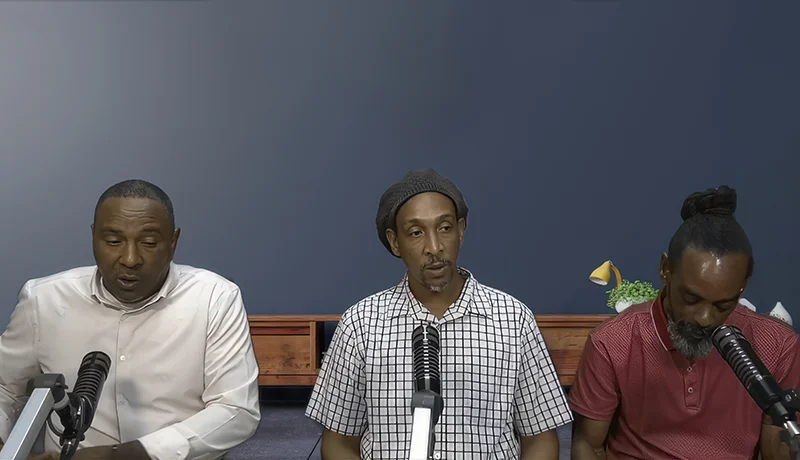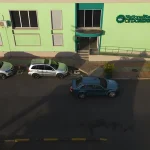
Airing live on this morning, June 27, 2025, the latest edition of Talking Point hosted a focused dialogue on Dominica’s evolving cannabis policy. With the National Cannabis Symposium set for July 9–10, the programme featured three central figures in the conversation: Dr. Kenneth Darroux, Chair of the Cannabis Advisory Committee; Dr. Al Mario Casimir, a pharmacologist and scientific consultant; and Mr. Trotter, who facilitated the discussion with probing questions and contextual framing.
This commentary draws exclusively from the DBS Radio broadcast, presenting a factual and unbiased overview of what was said, without extrapolation or editorial commentary.
Framing the Dialogue: Education Before Legislation
Dr. Darroux emphasized from the outset that Dominica is not yet at the stage of final legislation and that public education is the government’s current priority. He explained that the two-day symposium was structured to foster public understanding and solicit feedback from stakeholders in health, law enforcement, agriculture, the church, and civil society.
There’s still some degree of uncertainty, still some ignorance… This is an opportunity for Dominicans to get the facts.
He noted that although other regional states have moved forward with cannabis reforms, some through decriminalization or legalization, Dominica is deliberately taking a cautious route, learning from both successes and missteps across the Caribbean.
Local Realities vs. Regional Trends
The programme drew repeated attention to the need for policy rooted in Dominica’s specific context. Mr. Trotter questioned whether existing public discourse truly reflects the complexity of cannabis reform, highlighting tensions between regional developments and domestic readiness.
Dr. Darroux responded by acknowledging that while countries like St. Vincent and the Grenadines, Jamaica, and Barbados have adopted varying models, Dominica must shape its own response:
We want to look at all of the implications before we go down that road… There’s no one-size-fits-all model.
He further clarified that the country’s approach is not dictated by political expediency or financial allure, but rather the need for public buy-in and robust institutional support.
Scientific Framing: Dr. Casimir Weighs In
Dr. Al Mario Casimir brought a technical perspective to the table. He began by laying out the basic pharmacological distinction between the compounds THC and CBD, noting that these cannabinoids have distinct medical effects, which policy must take into account. He cautioned against conflating medical cannabis with recreational use:
When we talk about medicinal cannabis, we’re not just talking about people smoking weed to feel good… We are referring to controlled formulations, dosages, delivery systems.
He cited research on cannabis in managing epilepsy, chronic pain, and chemotherapy-related nausea, pointing out that CBD, when used in clinical settings, has proven efficacy with low risk of dependency.
Importantly, Dr. Casimir also flagged THC’s potency and its possible effects on adolescents and individuals predisposed to mental health disorders. He urged local legislators to avoid importing overly liberal models without robust data collection and regulatory oversight.
The Church and Law Enforcement: Two Critical Stakeholders
One of the more candid parts of the discussion was a reflection on the role of the church and law enforcement in shaping cannabis policy. Dr. Darroux admitted that both institutions have historically taken conservative positions, and any policy shift must engage them early and respectfully.
The church has a moral voice, and law enforcement has a public safety mandate. We cannot ignore either.
While no official position was disclosed on how policing strategies might evolve, Dr. Darroux noted that the decriminalization of small quantities for personal use remains a point of active discussion, particularly regarding criminal records and the burden on the court system.
Will Farmers Benefit?
Mr. Trotter raised concerns about whether small farmers, the traditional cultivators of cannabis in Dominica, would benefit under any new regulatory system. He questioned whether corporate interests could displace locals, as seen in other jurisdictions.
Dr. Darroux responded with guarded optimism:
We’re not going to adopt a system that marginalizes the people who’ve been growing this crop in the shadows for decades… but it has to be structured.
He emphasized the need for standards, licensing, and cooperatives, citing lessons from St. Vincent, where lack of structure has led to dissatisfaction among grassroots cultivators.
Dr. Casimir added that for Dominica to benefit from any commercial model, local labs, training institutions, and compliance officers must be part of the roll-out. He raised the need for qualified pharmacists and lab scientists, as product testing and consumer safety are critical in a regulated market.
Public Education and Misinformation
Throughout the programme, all three speakers returned to the importance of public education. Dr. Darroux conceded that many Dominicans still equate cannabis reform with “opening floodgates” to recreational abuse, while others expect immediate profit.
There is still a lot of misinformation… We want people to come to the symposium not to protest or push one agenda, but to learn.
Mr. Trotter supported this, pointing out that generational attitudes toward cannabis remain deeply shaped by colonial-era narratives and religious teachings, and changing those perceptions requires deliberate effort.
No Set Timeline, but Momentum Is Building
In response to a question about timelines, Dr. Darroux said there is no fixed date for legislation. He clarified that the advisory committee is still in the information-gathering phase and will not propose a bill until consultations are complete.
The symposium isn’t the end of the conversation, it’s the beginning of a broader process.
Mr. Trotter closed the discussion by affirming that whether or not consensus is achieved immediately, Dominicans now have a chance to shape their own model, guided not by haste or foreign pressure, but by evidence and dialogue.
Final Observations
The Talking Point segment served less as a policy pitch and more as an attempt to clarify Dominica’s position: measured, consultative, and science-informed. While it did not offer concrete legislative proposals, it outlined a clear commitment to public engagement and signaled that national cannabis reform will not be rushed.
The July 9–10 National Cannabis Symposium, hosted by the Ministry of Agriculture, Fisheries, Blue and Green Economy, is expected to include representation from medical professionals, security services, legal experts, religious leaders, and members of the agricultural sector.
As Dr. Casimir concluded:
This isn’t just a plant—it’s policy, it’s public health, and it’s science. We must treat it that way.
This article is copyright © 2025 DOM767




